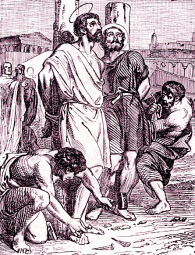Lives of the Saints
Our Models and Protectors
Spiritual Bouquet:
June 18

Saint Marcellianus
Saint Marcus and
Saint Marcellianus
Martyrs
(† 286)
Saint Marcus and Saint Marcellianus were twin brothers of an illustrious family in Rome, who had been converted to the Faith in their youth and were honorably married.
When Diocletian ascended the imperial throne in 284, the pagans raised persecutions; the brothers were then thrown into prison and condemned to be beheaded. Their friends obtained a delay of the execution for thirty days, that they might prevail on them to worship the false gods. Tranquillinus and Martia, their afflicted pagan parents, accompanied by their sons' wives and their little babes, endeavored to move them by the most tender entreaties and tears. But Saint Sebastian, an officer of the emperor's household, arriving in Rome soon after their confinement, daily visited and encouraged them.
The issue of the conferences was the happy conversion of the father, mother, and wives, also of Nicostratus, the public stenographer, and soon afterwards of Chromatius, the judge, who set the Saints at liberty and abdicating the magistracy, retired into the country. Marcus and Marcellianus were concealed by a Christian officer of the imperial household, in his apartments in the palace, but they were betrayed by an apostate and reimprisoned. Fabian, a judge who had succeeded Chromatius, condemned them to be bound to two pillars, their feet nailed to them. In this posture they remained a day and a night, and on the following day were stabbed with lances. Their martyrdom occurred in the year 286. Their tomb and that of their father, Saint Tranquillinus, was found in Rome, in 1782, in the church of Saint Cosmas and Saint Damian, adjoining that of the martyred pope, Saint Felix II. They are honored particularly in Spain, where the city of Badajoz escaped destruction by their intercession.
Reflection. We know not what we are until we have been tried; that love alone is sincere which has stood the proof. It costs nothing to say we love God above all things, but persecution shows who is a hireling, and who a true pastor, says Saint Bernard.
Little Pictorial Lives of the Saints, a compilation based on Butler's Lives of the Saints, and other sources by John Gilmary Shea (Benziger Brothers: New York, 1894).